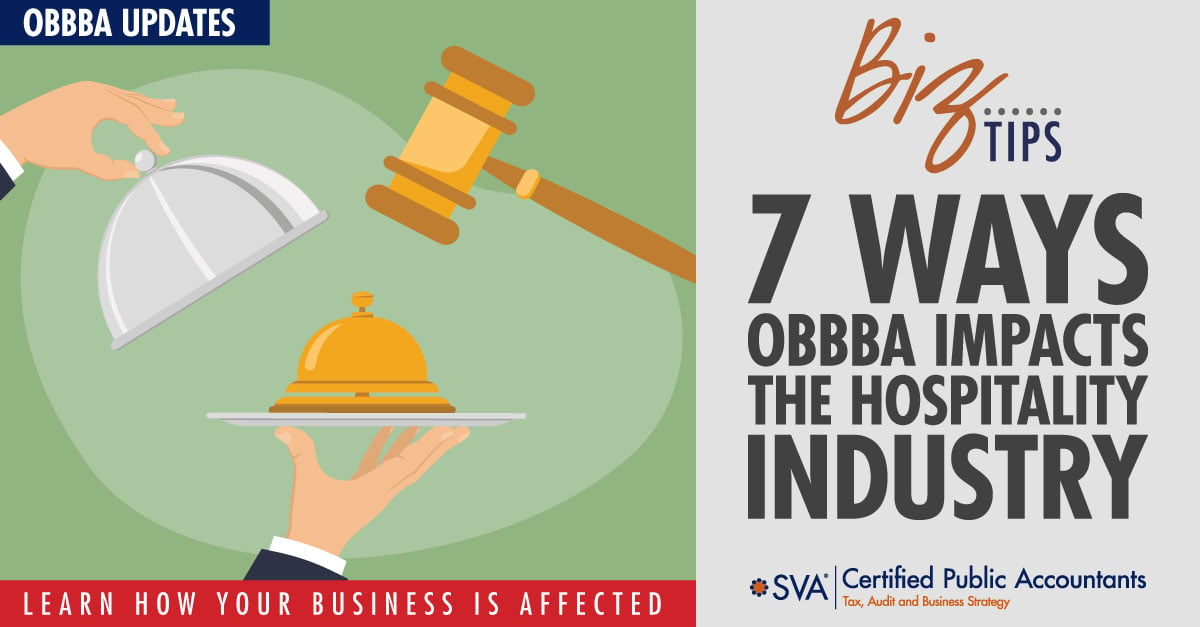| Highlights: |
- Summarizes seven key ways the One Big Beautiful Bill Act (OBBBA) alters tax, financing, and compliance for hotels, restaurants, and resorts in hospitality.
- Explains major tax provisions like permanent 100% bonus depreciation, increased Section 179 expensing, and the permanent Qualified Business Income (QBI) deduction under the new law.
- Offers planning actions for hospitality owners, such as updating payroll reporting for tips/overtime, reviewing interest deduction limits, and accounting for differing state conformity rules.
|
OBBBA has opened up new opportunities, and some added responsibilities, for hospitality business owners. Whether you operate hotels, resorts, or restaurants, the question is, how does OBBBA affect the way you manage your business?
7 Major Ways OBBBA Is Impacting the Hospitality Industry
From depreciation and financing to payroll reporting and pass-through taxation, seven major areas stand out. Each one influences how you plan, invest, and operate in the years ahead. Understanding them now can help you turn new rules into real advantages.
1. Bigger, Faster Tax Deductions with 100% Bonus Depreciation
OBBBA restores and makes permanent 100% bonus depreciation, letting you immediately deduct the full cost of qualifying assets placed in service after January 19, 2025.
For hospitality businesses that regularly replace furniture, fixtures, or kitchen equipment, this is a meaningful boost to cash flow. Instead of spreading deductions over several years, you can capture the full benefit right away.
What you can do now:
| Audit Your Upcoming Capital Plans |
Identify projects (like renovations or PIPs) that could qualify for full expensing. |
| Use Cost Segregation Studies |
These break down building components to find more assets eligible for bonus depreciation. |
| Watch for State Conformity Differences |
Some states may not follow the federal rules exactly, which can affect your overall tax picture. |
We recommend refreshing your capital budgeting models now, before vendors, contractors, or timelines are locked in, so you don’t leave savings on the table.
(Download Video Transcript)
2. Expanded Section 179 Expensing Offers More Flexibility
Section 179 expensing limits have increased, allowing up to $2.5 million in immediate deductions for qualifying property, with phaseouts beginning at $4 million.
This can be especially valuable for smaller properties or incremental improvements that may not qualify under bonus depreciation. The two provisions can work together to give owners more flexibility in managing both large and small capital projects.
What you can do now:
| Compare Section 179 and Bonus Depreciation |
Some assets may fit better under one rule than the other. |
| Use the Higher Limit for Smaller Upgrades |
Things like new POS systems, vehicles, or kitchen replacements might be perfect candidates. |
| Model Scenarios With Your CPA |
For large projects, phaseouts might limit benefits; planning helps avoid that. |
(Download Video Transcript)
3. Payroll and Tip Reporting Get More Complex and More Important
Starting in 2025, tipped and overtime-eligible employees can deduct certain tip and overtime income on their individual tax returns. For hospitality employers, that’s a win for staff morale, but also a new administrative responsibility.
Businesses will need to accurately track and report these amounts on W-2s and payroll systems, distinguishing “qualified” income from general wages.
What you can do now:
| Coordinate With Your Payroll Provider |
Ensure your systems can track and categorize qualified tips and overtime pay separately. |
| Educate Your Team |
Staff should understand what qualifies and how this benefits them. |
| Create an Internal Compliance Checklist |
Staff should understand what qualifies and how this benefits them. |
4. More Breathing Room on Interest Deductions
For many hospitality operators, debt is a key part of growth. OBBBA’s update to Section 163(j) allows depreciation and amortization to be added back to the interest limitation calculation, effectively letting you deduct a higher portion of interest expense.
This makes borrowing more cost-effective and can tilt the scales in favor of expansion.
What you can do now:
| Review Existing and Upcoming Debt |
See how much additional interest expense you can now deduct. |
| Re-Evaluate Your Financing Mix |
The ability to deduct more may make debt-funded growth projects more attractive. |
| Model Debt Versus Equity Funding |
Use updated assumptions when comparing the long-term costs of capital projects. |
5. Permanent Qualified Business Income Deduction
The Qualified Business Income (QBI) deduction — allowing eligible owners of pass-through entities to deduct up to 20% of qualified business income — is now permanent under OBBBA. For hotels, restaurants, and resorts operating as LLCs, S-corps, or partnerships, that means ongoing tax savings and greater planning certainty.
The permanence of QBI encourages reinvestment, expansion, and long-term planning without fear that a major tax benefit will sunset in a few years.
What you can do now:
| Revisit Your Entity Structure |
The deduction is available only to certain types of income and business entities. The right structure can make a big difference. |
| Review Compensation Strategies |
Wages and asset levels can affect eligibility and limitation thresholds. |
| Plan for Long-Term Consistency |
Because the deduction is here to stay, modeling your projected income through different growth stages can help maximize savings over time. |
(Download Video Transcript)
6. A Simpler 1099 Reporting Process
Beginning in 2026, the threshold for issuing Form 1099-NEC or 1099-MISC increases from $600 to $2,000 (indexed for inflation). This update will reduce paperwork and compliance time, especially for hospitality operations that rely heavily on independent contractors and vendors.
What you can do now:
| Update Vendor Policies |
Adjust your contracts and internal accounting systems to reflect the new threshold. |
| Communicate the Changes |
Vendors and contractors should know what to expect to prevent confusion during tax season. |
| Plan Workflow Updates |
Fewer forms mean simpler reporting, but thresholds must still be monitored carefully for exceptions. |
7. Keep an Eye on State Conformity Rules
Not every state automatically conforms to federal tax law changes, and that can complicate your planning. Some states may “add back” federal deductions like bonus depreciation or interest expense, reducing your overall benefit.
What you can do now:
| Perform a State-by-State Review |
Especially important if you operate in multiple states or own properties across regions. |
| Build Add-Backs Into Forecasts |
Your cash-flow projections should account for any expected state adjustments. |
| Monitor Legislative Updates |
States often take months (or years) to decide whether to conform. Stay flexible until guidance is final. |
Positioning for Success
OBBBA opens doors for hospitality owners ready to plan strategically. It rewards investment and modernization, but it also demands greater coordination between finance, payroll, and tax professionals.
SVA’s hospitality specialists can help you model these new opportunities, adjust capital spending timelines, and streamline payroll and compliance processes.
Now is the time to refresh your playbook, and SVA is here to help you make the most of every opportunity under the new law.
© 2025 SVA Certified Public Accountants

